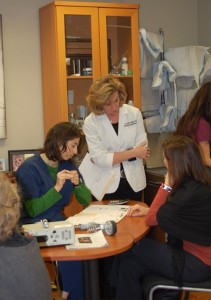Emily Jeter, OTR/L, MSPT, CHT grew up in a medical family, but broke the mold in the seventies when she decided not to follow her twin sister into the field of nursing. Instead, she earned a dual degree to become a local leader in occupational and physical therapy.
 Founder of Jeter Rehab Therapy, Jeter cares about patient treatment and recovery. By offering an open clinic in treating most cervical/thoracic/upper extremity injuries, the staff is able to interact with each patient to provide a village of optimal care. By assessing individual needs and tracking progression, therapists take each patient through their own specific rehabilitation program. “I tell my patients that we can help you feel better, but we want you to be better,” says Jeter.
Founder of Jeter Rehab Therapy, Jeter cares about patient treatment and recovery. By offering an open clinic in treating most cervical/thoracic/upper extremity injuries, the staff is able to interact with each patient to provide a village of optimal care. By assessing individual needs and tracking progression, therapists take each patient through their own specific rehabilitation program. “I tell my patients that we can help you feel better, but we want you to be better,” says Jeter.
An Emmy and Tony award winner, Jeter’s brother developed an injury while performing on Broadway and she then became interested in performing arts rehabilitation. She now treats many D.C. professional sports and performing arts teams, including the Washington Wizards and Capitals.
Through her brother, Jeter became involved with the LGBTQ community and was soon asked to extend her outreach by working with LGBTQ patients at Whitman-Walker Health, an organization that leads in healthcare equality, providing fair and cost-effective health care to the LGBTQ community.
“I was approached by the Whitman-Walker Health Center Medical/Operating Team in D.C. They had a great interest in my clinic and treatment style approach and asked me to provide rehabilitation services at their new center,” says Jeter.
Jeter Rehab Therapy uses monthly input from patients to provide feedback on treatment that is used to help provide the best ultimate therapeutic results. When searching for treatment, Jeter reminds everyone to research and interview potential therapy providers, asking questions about insurance coverage, discharge procedures and modalities used. Jeter’s outreach has included respectfully addressing the specific concerns and rehabilitation goals of the transgender community.
“Ask many questions,” says Jeter. “At Jeter Rehab Therapy, we are patient advocates. We want our patients to understand the injury process as well as the healing process. We teach our patients the anatomy and biomechanics involved with the specific injury.”
Active patients will receive better results from therapy. “Be present. Be involved. Ask for clarity from your therapist,” advises Jeter.


